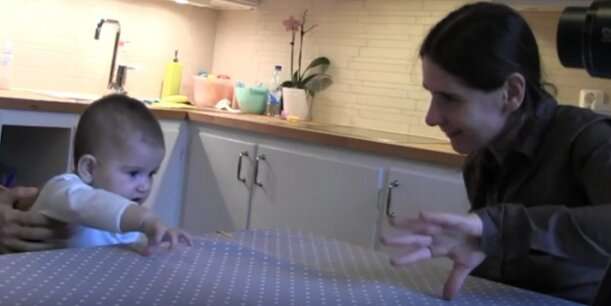Babies know when you imitate them—and like it

Six-month old infants recognize when adults imitate them, and perceive imitators as more friendly, according to a new study from Lund University in Sweden. The babies looked and smiled longer at an adult who imitated them, as opposed to when the adult responded in other ways. Babies also approached them more, and engaged in imitating games. The research is published in PLOS One.
In the study, a researcher met six-month old babies in their homes and played with them in four different ways. The researcher either: imitated everything the babies did as a mirror, or as a reverse mirror, imitated only the bodily actions of the babies while keeping an immobile face, or responded with a different action when the babies acted. The latter is called contingent responding and is how most parents would respond to their baby—when the baby does or needs something, you react accordingly.
The researchers found that the babies looked and smiled longer, and tried to approach the adult more often, during the close mirroring of their actions.
"Imitating young infants seems to be an effective way to catch their interest and bond with them. The mothers were quite surprised to see their infants joyfully engaging in imitation games with a stranger, but also impressed by the infants' behaviors," says Gabriela-Alina Sauciuc, researcher at Lund University and main author of the study.
There was also much testing behavior during imitation. For example, if the baby hit the table and the researcher imitated that action, the baby would then hit the table several times, while carefully watching the researcher's responses. Even when the researcher did not show any emotions at all while imitating, the babies still seemed to recognize that they were being imitated—and still responded with testing behavior.
"This was quite interesting. When someone actively tests the person who is imitating them, it is usually seen as an indication that the imitated individual is aware that there is a correspondence between their own behavior and the behavior of the other," Sauciuc says.
Scientists have long speculated that, through frequent exposure to being imitated, babies learn about cultural norms and interactional routines, or that shared actions are accompanied by shared feelings and intentions. But the empirical evidence to back up such theories is largely missing.
"By showing that six-month-old infants recognize when they are being imitated, and that imitation has a positive effect on interaction, we begin to fill up this gap. We still have to find out when exactly imitation begins to have such effects, and what role imitation recognition actually plays for babies," Sauciuc concludes.
More information: Gabriela-Alina Sauciuc et al. Imitation recognition and its prosocial effects in 6-month old infants, PLOS ONE (2020). DOI: 10.1371/journal.pone.0232717

















